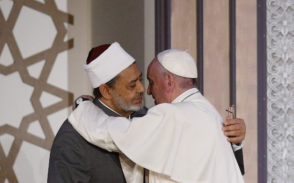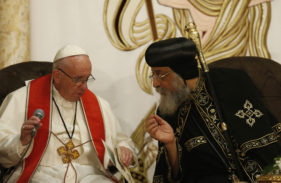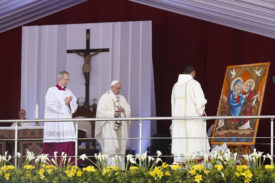By John Allen, Special to The Tablet

CAIRO/ROME — Pope Francis’ April 28-29 trip to Egypt was full of ironies, among them a Catholic pope being received as a hero in an overwhelmingly Muslim nation, and the fact that one of the world’s most spontaneous and people-loving figures spent most of his time surrounded by a thick security cocoon enforced by the Egyptian military and security services.
Perhaps the greatest irony, however, is this: A pope came to one of Islam’s most important sites to throw down an unmistakable gauntlet, and yet, not only was there no backlash, but he actually drew widespread enthusiasm.
Unlocking how Francis managed to pull that off is key to understanding the lasting significance of what happened in Cairo over one remarkable weekend in late April.
This was the pontiff’s 18th overseas trip, and by now his profile as a world traveler is fairly clear. He’s a media magnet, given to spontaneous gestures, memorable pastoral language and crowd-pleasing imagery. He’s also relentlessly a man of dialogue and friendship, sparing no effort, as he would put it, to build bridges rather than walls.
While all that has fueled Francis’ popularity, some skeptics wondered if this “feel-good” pope would be up to the task in Egypt.
For instance, had the pontiff gone to Al-Azhar mosque and university in Cairo, the most prestigious center of learning in the Sunni Muslim world, and not openly confronted the scourge of Islamic terrorism – especially coming just days after two Coptic Christian churches in Egypt had been bombed on Palm Sunday, leaving 45 people dead – the outing might have been seen as a missed opportunity, perhaps even an attempt at appeasement.
That, however, was definitely not the Pope Francis who showed up in Egypt.
Yes, there were familiar touches of intimacy and outreach – at one point, for instance, Sheikh Ahmad al-Tayeb, the Grand Imam of Al-Azhar, seemed visibly moved when Francis spontaneously referred to him as “my brother.”
Yet the pontiff didn’t pull any punches, openly challenging Islamic religious leaders to step up their efforts to “unmask the violence that masquerades as purported sanctity.”
“We have an obligation to denounce violations of human dignity and human rights, to expose attempts to justify every form of hatred in the name of religion, and to condemn these attempts as idolatrous caricatures of God,” he said.
An Education in Tolerance
Francis made a special point of insisting on the need to educate young people in tolerance, which is a point with a clear political edge in Egypt. The government of President Abdel Fattah al-Sisi, a former army general who came to power vowing to curb radicalism, has called for a sweeping revision of school curricula to eliminate prejudicial treatments of non-Islamic religions, but the move has been resisted by elements of the clerical establishment – including some at Al-Azhar itself.

Also on Friday, Francis spoke to a group of political and civil leaders. (The setting was a hotel and conference center owned by the military, another reminder of how security concerns generated by the very radicalism Francis was denouncing pervaded the trip.)
There too, the pontiff did not mince words.
“I think in a particular way of all those individuals who in recent years have given their lives to protect your country: young people, members of the armed forces and police, Coptic citizens and all those nameless victims of various forms of terrorist extremism,” the pope said.
(The Coptic Orthodox Church is the largest Christian denomination in Egypt, and also the largest Christian community anywhere in the Middle East. At somewhere between 10 and 20 percent of the population, depending on which count one accepts, the Copts are frequent targets of harassment and persecution.)
“I think also of the murders and the threats that have led to an exodus of Christians from northern Sinai,” Francis said. “I think of the victims of the attacks on Coptic churches, both last December and more recently in Tanta and Alexandria.”
That might seem no more than a simple pro-forma statement of sympathy, but it’s important to remember that the last time a pope spoke out after the bombing of a Coptic church, which was Benedict XVI in 2011, the Egyptian government declared it “unacceptable interference” in its internal affairs and recalled its ambassador, while Al-Azhar froze its dialogue with the Vatican.
In that context, Francis’ clear choice not to let discretion be the better part of valor was striking, as was the fact that instead of protest, he drew cheers, hugs and rapt attention.
On Saturday, while celebrating Mass for the country’s tiny Catholic community in a soccer stadium also owned by the military, Francis delivered another memorable soundbite, saying “the only fanaticism believers can have is that of charity!”
“Any other fanaticism does not come from God, and is not pleasing to him!” he said. While Francis was speaking to Christians, in the Egyptian and Middle Eastern context, the remark obviously had a much wider application.

Francis likely was able to be so blunt because he had spent the better part of the last four years putting political and social capital into the bank with the Muslim world – insisting that Islam is a religion of peace, that there is no such thing as “Islamic terrorism,” and generally being seen as a friend, especially when Islam has been under rhetorical assault by other Western figures.
In Egypt, it would seem, he decided to start spending some of that capital.
For the last decade and a half, ever since 9/11, the Western world has been trying to figure out how to engage Islam constructively, often veering between the two poles of a hawkish “clash of civilizations” and a dovish denial of reality. In effect, what Francis rolled out in Cairo was a third way – build friendships first, and then, when the time is right, press your case, because then you have a chance of being heard.
That, in short, is the significance of the trip, and the early take probably should be that it wasn’t too bad for a weekend’s work.
John L. Allen Jr. is the editor of Crux, an independent Catholic news site available online at www.cruxnow.com. The DeSales Media Group in the Diocese of Brooklyn is one of Crux’s sponsors.
Related:
Unmask Violence Posing as Holy, Pope Tells Religious Leaders in Egypt
Pope’s Visit Seen as Great Blessing to Egypt
Scenes of the Pope in Egypt
